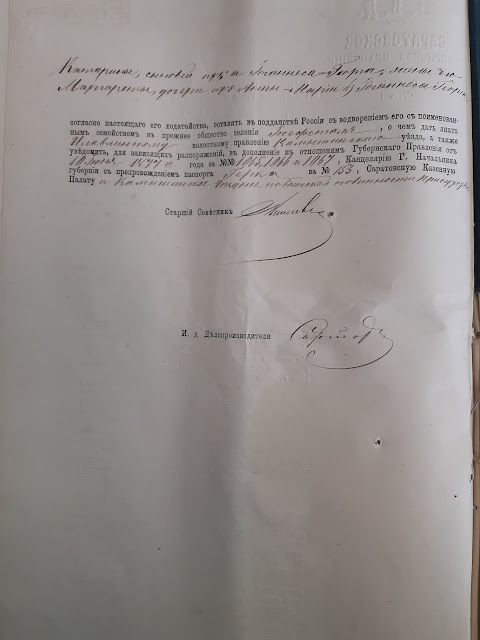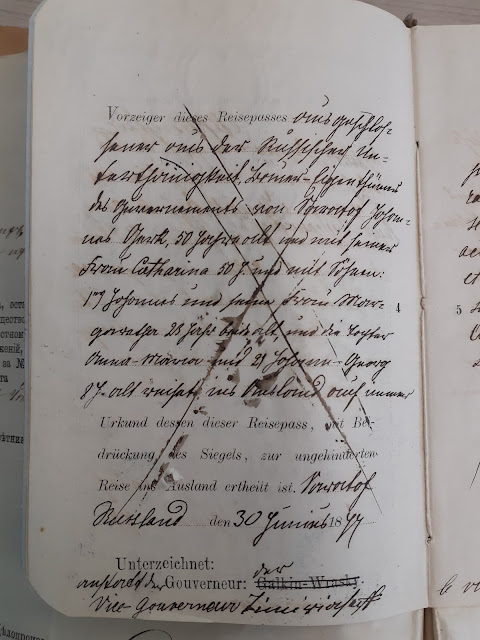 |
Volga German refugees bound for Canada - March 1924
|
 |
Paul Gerk (upper left), March 1924.
|
100 years ago, on March 23, 1924, my grandfather, Paul Gerk, began his journey to a new chapter of his life.
Living in a refugee camp since December 1922, having escaped from the Volga River area of Russia, Paul Gerk would begin his new life in Canada.
I can't even imagine what his journey was like. Leaving Russia after being imprisoned by the Communists. Paul left with his oldest brother, Michael, and his wife Margareta Stremel Gerk. Michael will die, probably from typhus, somewhere near Minsk and the Polish border.
His hope seemed to be to connect with family in Fort Dodge, Iowa.
In his original transport list from Minsk to Frankfurt/Oder, lists Gottfried Winter as a potential contact.
 |
"Der Wolgadeutsche", January 1923
|
Eventually, Paul Gerk will be sponsored by a family in Saskatchewan, near Holdfast.
His trek started 100 years ago this week. On March 22, 1924, a group of about 76 men will leave the refugee camp in Frankfurt/Oder, and travel to the Port of Hamburg.
We have a description of this first leg of the journey, written by S. Feist, in the May 1924 edition of "Clemens Blatt".
Feist writes:
"After the Canadian Catholic Church Members Society had successfully
arranged for the German refugees’ emigration from the Volga and Black
Sea Provinces to Canada and their settlement possibilities amongst the
Canadian farmers, it was then their most important duty to assemble and
conduct their transport, departure, and the travel route. Among the
first duties of the authoritative St. Raphael Society in Hamburg
regarding the assembling of the first refugee transport was to place it
under our care, namely the Catholic Social Welfare. It accordingly then
became our duty to prepare the emigrants for emigration. On March 19th I
went to the refugee camp located in Frankfurt on the Oder to get and
prepare a full and complete list of the emigrants. Immediately upon
getting acquainted, those representing the Catholic Volksverein in
Canada, which had the prepared emigration requirements, declared that 76
persons were already listed for emigration; however, with the explicit
wish that all concerned organizations might do their utmost to have the
families of the emigrants soon follow them to Canada. The transport’s
departure was firmly set for March 23rd. To lighten the parting of these
emigrant heads of families, a wish was generally expressed that our
Diocese Bishop, Cardinal Kessler, might conduct a solemn farewell Mass
in the Frankfurt camp. Early in the morning of March 22nd Bishop Kessler
and I traveled together to the camp, where we were cheerfully welcomed
by the refugees.
In the considerably bleak and cold camp-church Bishop Kessler conducted
high mass and at its end he gave a short speech. He stated that this
approaching parting is a parting from wife and children, even though on
unfamiliar soil. He further stated that he wanted the emigrants to
always keep their holy faith and always keep in mind to be good
Catholics in Canada just as they had been in their homeland diocese. In
all necessities he urged them to take refuge in prayer and never give up
hope, and that after the bitter hour of parting there will be a happy
reunion. He also stated that the St. Raphael Society and the Catholic
Social Welfare in cooperation with the Catholic Volksverein in Canada
will exert every means possible to succeed in the shortest period of
time to have their families soon rejoin them in Canada.
In the evening of March 23rd the emigrants, after a tearful and
difficult departure, began their travel from the “Grube Vaterland”
station, a branch depot of the Frankfurt-Cottbus line, in three already
provided railway cars. Here, too, various speeches of comfort were
spoken to the left-behind wives and children and the departing men.
At the railway station in Berlin via a telegraph notification the
entire Board of Directors of our Catholic Social Welfare for Russia
appeared. Here again the emigrating refugees received wishes for their
infinite good, and were promised that everything will be set in motion
so that their left-behind families can most quickly follow them. On
Sunday, March 23rd, we arrived in Hamburg and were welcomed by a
representative of the St. Raphael’s Society and an agent of the
Emigration Office. Under the navigation agent’s escort we came to the
emigration hall. After the completion of the usual formalities, a
breakfast was served for the refugees. Then after a medical examination
they were brought into two pavilions. At the suggestion of he emigrants a
vesper and rosary service was conducted. On Monday morning the Rev. Dr.
Kralewsky of the St. Raphael Society conducted a high mass.
Then the emigrants stepped into the usual completion formalities for
emigration. It must be emphasized that the medical examination is
strictly undertaken. Up to the examination time the emigrants had been
cheerful and their humour also had not failed them. After the last
medical exam, then the medical examination results were announced,
resulting in a sad picture. Of the 76 persons examined, 27 were denied
emigration due to illness. It must also be mentioned that our (Catholic
Social Welfare) emigration transport was praised by the Board of
Directors and the Navigation Association as having made a good
impression. It can therefore be determined that our emigrants also will
make a good impression upon the American farmers.
On March 25th, the Annunciation Day, the General secretary of the St.
Raphaelsvereins (St. Raphael Society), namely Rev. P. Timpe came and
conducted a high mass in the chapel on the (emigration hall) site. P.
Timpe at the end of the mass, which he kindly had set up for the
refugees, gave a short speech to give courage to the departing emigrant
group. He spoke of his hope that by their good and willing work in
Canada the farmers there will be ready and willing to also help bring
their families to them. On March 26th we escorted the 49 emigrants to
the train station, from which they were to go Rotterdam. Rev. P. Timpe
likewise was at the train station and once again delivered his promise
and pledge before their eyes. Then the train started on its way and
everyone shouted, “Auf Wiedersehen”. (Till we meet again.)
That same evening we traveled back with the emigrant-denied people
going through Berlin to the Frankfurt camp. To give the American friends
an opportunity to help them get to know the emigrants individually, we
gave them photographs, which eventually could help establish
acquaintanceships or kinships. In closing, I point out with firm
satisfaction that the people we selected for the first transport have in
all concerns made a very good impression. I also hope that the American
farmers will also be satisfied with them. In conclusion, the following
request is also made to the Canadischen Katholichen Volksverein
(Canadian Catholic Church Members Society): that in due course they will
want to do everything possible so that the left-behind family members
can soon follow to join their loved ones. "
List of Refugees to Canada March 1924
|
|---|
| Richelhof, Friedrich |
Abt, Kilian |
Weisbeck, Johannes |
Mildenberger, Jakob |
Stankowitz, Johannes |
| Diel, Adam |
Burgardt, Peter |
Gerk, Paul |
Blattner, Jakob |
Rau, Heinrich |
| Rutzman, Josef |
Stalldecker, Albinius |
Frank, Adolf |
Weichel, Georg |
Schermer, Adam |
| Storm, Alexander |
Zelbel, Reinhold |
Okulewitsch. Leo |
Eckermann, Johannes |
Dandörfer, Jakob |
| Abt, Florian |
Neitzich, Peter |
Gottseltig, Johannes |
Weichel, Peter |
Markel, Georg |
| Martel, Sebastian |
Wagner, Clemens |
Weingardt, Johannes |
Weichel, Peter |
Wucheuauer, Georg |
| Meringer, Michael |
Herlein, Anton |
Stremel, Georg |
Seelmann, Heinrich |
Werner, Georg |
| Eberhardt, Johannes |
Terre, Johannes |
Schönberger, Josef |
Rolsing, Andreas |
Specht, Georg |
| Schowalie, Johannes |
Wander, Johann |
Schönberger, Dionysius |
Specht, Josef |
Rohleder, Johann |
| Schowalie, Adolf |
Weisbeck, Johannes |
Schamber, Raymund |
Dandörfer, Peter |
Rieth, Georg |
 |
Passport of Paul Gerk - March 1924
|
I never knew my grandfather. But I do understand the courage it must have taken to leave all your family and come to a strange new land...and also remember the kindness of so many people that helped our family settle in the amazing nation that is Canada.








































